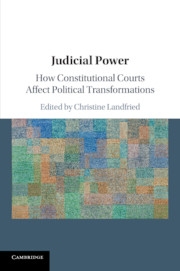Book contents
- Judicial Power
- Judicial Power
- Copyright page
- Contents
- Contributors
- Acknowledgments
- Introduction
- Part I Democratic Legitimacy of Judicial Power
- Part II Democratic Effectiveness of Judicial Power
- Part III Legitimacy, Effectiveness, and Judicial Methods of Decision-Making
- Part IV Judicial Power in Processes of Transformation
- Index
Part I - Democratic Legitimacy of Judicial Power
Published online by Cambridge University Press: 27 January 2019
- Judicial Power
- Judicial Power
- Copyright page
- Contents
- Contributors
- Acknowledgments
- Introduction
- Part I Democratic Legitimacy of Judicial Power
- Part II Democratic Effectiveness of Judicial Power
- Part III Legitimacy, Effectiveness, and Judicial Methods of Decision-Making
- Part IV Judicial Power in Processes of Transformation
- Index
Summary
- Type
- Chapter
- Information
- Judicial PowerHow Constitutional Courts Affect Political Transformations, pp. 19 - 138Publisher: Cambridge University PressPrint publication year: 2019
- 3
- Cited by



